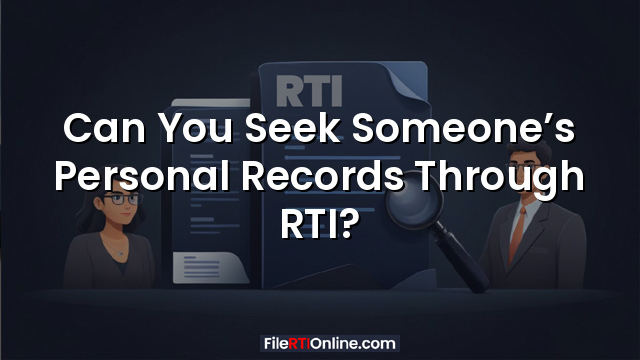Can You Seek Someone’s Personal Employment Records Through RTI? What the Law Actually Allows
The Right to Information (RTI) Act is one of India’s strongest transparency laws. However, many people misunderstand the limits of RTI—especially when it comes to personal records, employment documents, and service details of other individuals.
A common question asked is:
“Can I get someone’s attendance sheet, salary slip, or employment records using RTI?”
The short answer:
No — unless there is a larger public interest or no court restriction exists.
The RTI Act protects personal information and bars disclosure where a court has forbidden it.
This article explains what you can and cannot obtain through RTI, with a real case example from the Central Information Commission (CIC).
What Personal Information Cannot Be Disclosed Under RTI?
Under Section 8(1)(j) of the RTI Act, the following categories of information are protected:
1. Personal information of an individual
This includes:
- Attendance sheets
- Leave records
- Salary details
- Medical records
- Personal service files
- Performance reports
- Disciplinary actions (unless public interest is involved)
This information cannot be disclosed unless the applicant proves overriding public interest.
Court-Restricted Information is Absolutely Barred
Under Section 8(1)(b):
If a court order prohibits disclosure, then the PIO is legally required to refuse it.
So even if otherwise disclosable under RTI, a court order overrides RTI rights.
Case Example: RTI Denied for Attendance Sheet of a BSNL Employee
To understand how this works, consider a real case handled Central Information Commission (CIC).
Background
A person filed an RTI application with BSNL asking for the certified attendance sheet of a woman working as a Technician at a telephone exchange.
The Public Information Officer (PIO) denied the request.
Why Was the RTI Denied?
During the hearing:
- The PIO explained that the applicant was a relative of the employee’s ex-husband.
- A Family Court decree from the Principal Judge, Dehradun existed.
- Under that decree, the ex-husband was barred from seeking any information about the woman from BSNL.
- Therefore, any RTI filed or his relatives must be treated as disposed of.
- The PIO argued that disclosure is prevented under Section 8(1)(b) because the decree expressly forbade sharing her information.
CIC’s Decision
The Commission agreed and held:
- The court order directly prohibits disclosure,
- Therefore the information is exempt under Section 8(1)(b) of the RTI Act,
- The attendance sheet cannot be given to the appellant.
This case shows that RTI cannot be used to access someone’s private or employment information—especially when a court has barred disclosure.
When Can Personal Employment Records Be Accessed Under RTI?
While most personal employment records are private, there are some exceptions:
1. If the person gives written consent
An employee can authorize disclosure of their records.
2. If it involves proven larger public interest
For example:
- Corruption investigation
- Misuse of public funds
- Fake employment claims
- Unauthorized absence affecting public service delivery
In such cases, the CIC may allow limited disclosure.
3. If the information relates to an official’s public duty, not private life
For example:
- Public servants’ posting details
- Designations
- Office orders
- Sanctioned posts
- Vacancies
These are not personal and must be provided.
What You Can Request Instead of Personal Data
If the intention is genuine, you can request non-personal data, such as:
- Service rules and policies
- Attendance rules
- Total number of employees present/absent on a given day (aggregate)
- Complaint action-taken report
- Generic service records of the office (not linked to a person)
This allows transparency without violating privacy.
Practical Takeaway
If you want personal employment records of someone through RTI:
You can get them only if:
- It is your own record, or
- The person authorizes disclosure, or
- There is clear and provable public interest, and
- No court order forbids it.
You cannot get them if:
- It relates to another individual’s private employment data, and
- There is a court order restricting disclosure.
Conclusion
RTI is a powerful tool, but it does not override privacy or court-mandated restrictions.
The BSNL attendance sheet case clearly shows that:
- Personal employment records are usually not open to public,
- Court orders take precedence over RTI,
- PIOs must protect confidential employee information.
If you are planning to file such an RTI, ensure your request is framed to seek public information, not personal data, unless you can justify a strong public interest.


